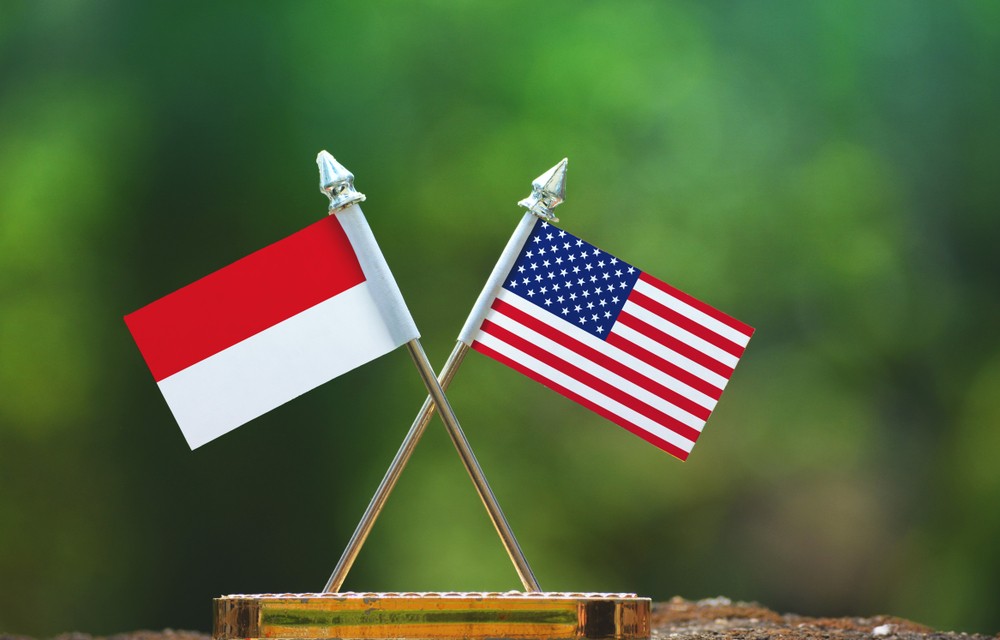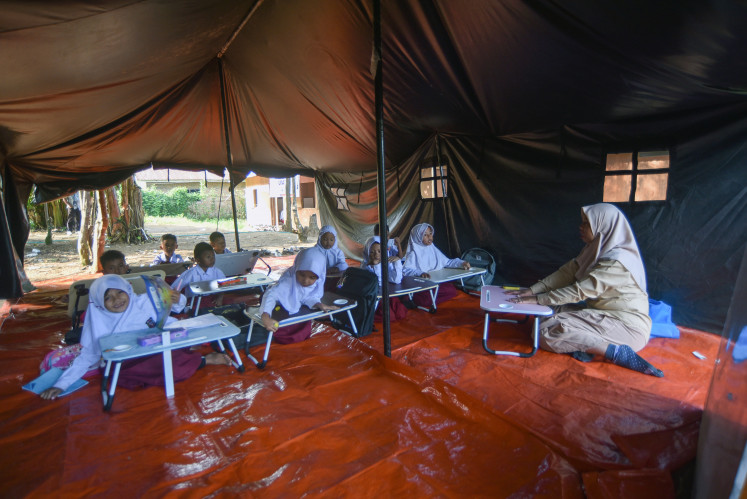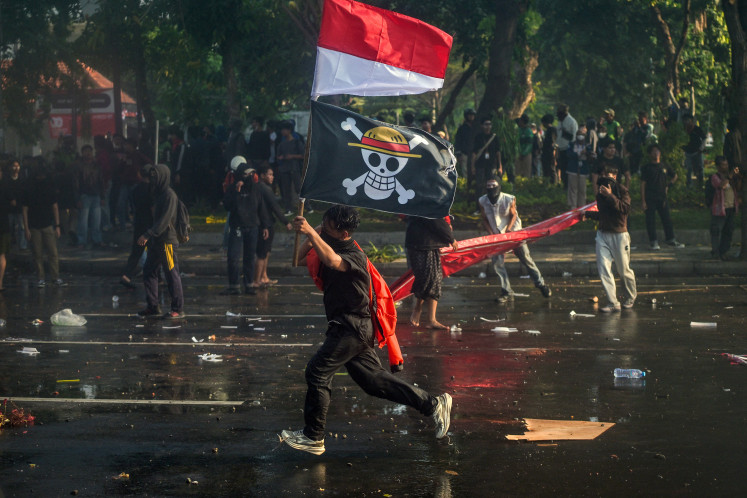Popular Reads
Top Results
Can't find what you're looking for?
View all search resultsPopular Reads
Top Results
Can't find what you're looking for?
View all search resultsCelebrating diversity, partnership and prosperity
Change text size
Gift Premium Articles
to Anyone
 As we navigate through today’s challenges amid the backlash of globalization, economic inequality, intense polarization and the resurgence of ultranationalism on the back of populist appeals, the two democracies need to renew and strengthen their relationship moving forward. (Shutterstock/Aritra Deb)
As we navigate through today’s challenges amid the backlash of globalization, economic inequality, intense polarization and the resurgence of ultranationalism on the back of populist appeals, the two democracies need to renew and strengthen their relationship moving forward. (Shutterstock/Aritra Deb)
T
his year marks the 70th anniversary of United States-Indonesia relations. The theme selected for this year’s commemoration is very timely and telling: celebrating diversity, partnership and prosperity.
As we navigate through today’s challenges amid the backlash of globalization, economic inequality, intense polarization and the resurgence of ultranationalism on the back of populist appeals, the two democracies need to renew and strengthen their relationship moving forward.
Last month, I gave a keynote speech at an American Chamber of Commerce Young Professionals Committee Homecoming event. Direct people-to-people contact like this breathes new life into our relations, built upon mutual interests, understanding and respect.
Many of us who studied or worked in the US have come to closely appreciate how diverse America really is. And it is this enriching element that allows the US to continually adapt and stand the test of time. The American people have traditionally welcomed those who come to their country in the belief of those unalienable rights for “life, liberty and the pursuit of happiness”.
In recent times, however, the US has experienced challenges of sustaining multiethnic norm-based democracy. Issues such as immigration and cultural diversity have often produced right-wing populist backlash.
Indonesia, too, faces its own characterized features when it comes to diversity. As a country, we are blessed to have hundreds of different ethnic groups living across the world’s largest archipelago. Accordingly, the collective struggle and shared ideals as one common people paved the way for our national independence. We take pride in our diversity and maintain core traditional values of harmony and tolerance.
The present and younger generations need to remember not to take these things for granted. We must studiously refuse any attempt to exploit primordial issues of ethnicity and religion that only divide our people. Our flourishing democracy is a means of ensuring representation and meaningful participation of the people, without turning it into a “tyranny of majority”.
In this context, joint initiatives such as the Indonesia-US Council on Religion and Pluralism deserves appreciation. It seeks to deepen our understanding of diversity and promote tolerance through shared positive experiences within and between our two peoples.
Educational programs and exchanges represent another key area for further cooperation. Education is key ingredient for successful and plural societies. The biggest challenge will be to manage between the hugely complex traditional education system and the urgency for reforms and institutional changes based on the changing demands of the 21st century.
Beyond shared values, the Indonesia-US relations must find broader and concrete ways to grow especially in areas of geopolitics and security cooperation. The Indonesia-US Strategic Partnership signed in 2015 has much to fill in terms of expectations. The increasing emphasis by the Trump administration on relations with Vietnam, Singapore and the Philippines, for instance, should not come at the expense of its ties with Indonesia.
The 2018 Special Report by the Council on Foreign Relations asserted that “the relationship between Indonesia and the US has long underperformed its potential”. It highlighted three particular areas in which such cooperation could further focus on: South China Sea, radicalism and the issues of piracy and transnational crimes.
Naturally, both Indonesia and the US share concerns about China’s growing regional assertiveness, particularly with respect to the South China Sea. While Indonesia is not a claimant state, we have vital interest in safeguarding our sovereignty as China’s nine-dash-line overlaps with the exclusive economic zone around the Natuna Islands. Indonesia remains committed to maintaining a “dynamic equilibrium” in the region.
Indonesia’s Indo-Pacific approach dates back to 2013 when then-foreign minister Marty Natalegawa proposed an Indo-Pacific Treaty of Friendship and Cooperation. At the East Asia Summit in November 2018, President Joko “Jokowi” Widodo reiterated five key elements: openness, inclusiveness, transparency, respect for international law and ASEAN centrality.
The issues of centrality of “ASEAN and its approach” are among the most notable differences to the Free and Open Indo-Pacific concept as promoted by the US-led Quad in recent times. Indonesia will continue to play a pivotal role in future discussions on regional peace and stability. Strengthening cooperation in defense and security will be of mutual strategic interest to both Indonesia and the US.
Economic relations between Indonesia and the US continue to grow, albeit modestly, in recent years. In light of prevailing pragmatic tendencies, this may be the most important determinant of our current relations. As our economy grows, so will the middle-class population, representing a larger potential consumer market.
Infrastructure development continues to be a focus area that requires private sector involvement. The digital scenes have also been rapidly expanding in recent years. Investments into local start-ups by US venture capitals and technology companies exemplify exciting growth opportunities.
At the same time, the US is seeking to become a net energy exporter by 2020. It has now become the world’s largest oil and gas producer as technological advances have increased production from shale formations. And this has opened up a new range of opportunities for the energy-hungry regions of East and Southeast Asia.
While the short-term effect will also impact the natural gas markets, a key export for Indonesia, the medium-to-long run affordability of energy will benefit economies in the region. We need to move quickly to take advantage through closer collaboration with the US energy producers and other players in the value chain.
Overall, bilateral trade reached US$28.6 billion last year, where Indonesia enjoyed a surplus of $8.2 billion. Both countries have since agreed to an ambitious road map to boost trade to $50 billion in the next few years. High on Indonesia’s priority list is the ongoing negotiation for the extension of tariff cuts for Indonesian goods under the US generalized system of preferences scheme.
Evolving global dynamics have brought new levels of complexities and challenges. Through the lens of Indonesia-US relations, we need to find new ways to harness our strengths and complement each other.
Together, let us celebrate our diversity, strengthen our partnership and work toward achieving prosperity, not only for the present but also for future generations of the two nations.










